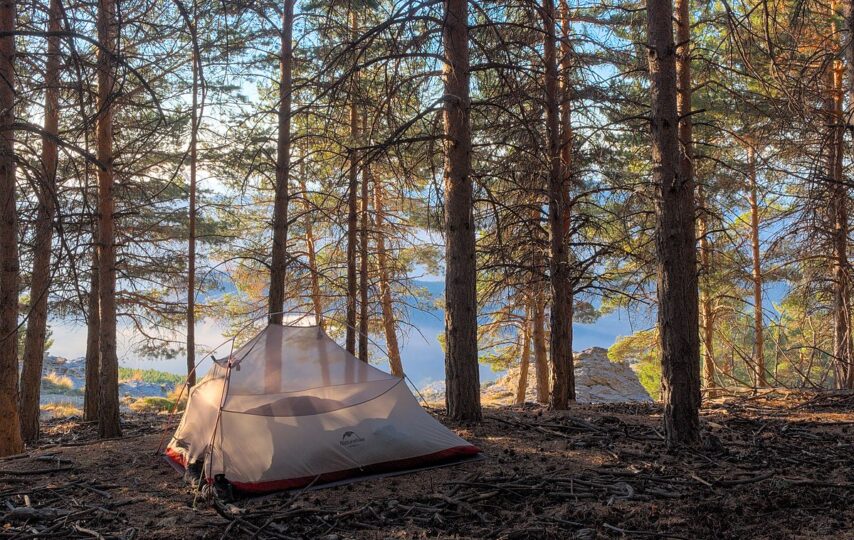Camping is a great way to get away from everyday life, and with a little preparation, you can feel confident and in charge of your trip. The great outdoors has what you need, whether you want to unwind during a vacation or go on an exciting recreational trip with your family.
The best way to learn about camping is to try it out right away. It is essential to keep in mind that your camping trip will rarely go according to plan, despite the fact that you may encounter a few roadblocks. Start making memories and learning the fundamentals of camping so that you can improve your skills.
First things first, let us ask ourselves: What is the purpose of camping?
People go camping for a variety of reasons, and they frequently combine a number of them.
Investing energy with loved ones
For some people, one of the most charming pieces of life is associating with loved ones. However, getting everyone together can be challenging. It can be difficult to manage the many different schedules, find uninterrupted time, and give everyone a chance to connect with one another. People go camping to spend time with their loved ones. On a setting up camp outing, everybody is together for quite a long time. Conversation flows naturally when you spend time together regularly.
Making new friends
Camping can also be a fun way to make new friends. When you pitch your tent in a campground with other people, you have a chance to meet new people. Getting away from it all, setting up camp, and choosing the best camping activities for your group are all reasons you’re there. Additionally, if children are present, they may find playmates of their own age at the nearby campsites. If you want to meet new people, recreational vehicle trips are an especially convenient type of camping.
Camping, on the other hand, can be a peaceful and calming experience away from civilization. Whether alone or with a couple of others, campers look for the opportunity to appreciate nature away from the groups. There are some kinds of campgrounds that have a lot of space between their campsites, so you can feel like you’re the only one there for miles.
An inspiring view, like ocean waves or mountain peaks, can help you feel more alone, but you don’t have to pitch a tent to enjoy a getaway. You can get the same chance to reset your internal clock and relax by staying in a mountain cabin. Regardless of where you decide to camp, getting rid of your day-to-day worries and cares can transform your outlook.
Getting away from a screen
We all require a break from the screens we use every day. Negative effects, such as poor quality sleep, can result from spending the entire day staring at our televisions, computers, and mobile phones. We are unable to get enough exercise or develop our social skills through face-to-face interactions because social media can become an addictive time drain.
A “reset” of the mind can be accomplished in a significant way by putting away electronics and taking in the natural sights and sounds. When days are filled with a lot of information, there isn’t time for quiet reflection, which is important for having a calm mind.
Spending quality time with kids and pets
As adults continue our busy lives, some members of our family receive less attention than others. When you are away from your cares and responsibilities, it is easier to spend quality time with them. Camping provides us with the opportunity to spend quality time with our children and pets.
Here are some helpful first-time camping tips from our team at MerrJep.al to help you get ready for your trip and have a great time.
The essentials
We have a few straightforward pieces of advice for those who are brand-new to camping:
- Go camping with a friend or family member who has been there before, if possible
The easiest way to learn about the outdoors is to have someone show you. Don’t worry if that’s not an option for you with a little research and practice, you can still learn everything you need to know.
- Try car camping first
Stay at a campground that is well-kept and do your homework ahead of time to find out what amenities are available. Try to arrive at daylight hours. When it is light outside, setting up your campsite is easier, and rangers or camp staff may be nearby to assist you if you have any questions.
- Work on setting up your shelter ahead of time
Peruse the guidelines at home, or quest YouTube for an instructional exercise well defined for your tent model. After that, practice pitching it in your living room or backyard. Until you get some experience, tents with different designs can be confusing.
However, imagine that you arrive at your campsite a little late, at night, and in the rain. When you get your tent up quickly, you’ll be glad! Also, before cooking in the wild, get used to your camping stove in your backyard or at a park.
- Stick to essential and important stuff for the present
There are endless devices that can make your life more straightforward on the outside, however first get a feeling of what setting up camp resembles before you burn through a lot of cash.
- However, if you can, make an investment in high-quality essentials
Choosing the cheapest gear is a recipe for a tent that leaks or a backpack that hurts your back.
Choosing a place for your first camping trip
Choosing the right spot is one of the most important first-time camping tips. As someone who is still learning the fundamentals of camping, it is a good idea to camp at a place where you will always be close to clean facilities for washing clothes and using the restroom.
When selecting a location for camping, always keep the following in mind:
Your objectives
Consider the rationale behind your camping excursion. Is it to explore new places or historic locations? to spend quality time with loved ones around the fire or to immerse yourself in the natural world? The best location will be determined by your camping objectives.
The time
In addition to your level of familiarity with a variety of climates, take into consideration the likelihood of precipitation, temperatures, and which locations provide the most picturesque seasonal views when selecting the best location for the season.
Access to the campsite
Some camping spots, like those that require backpacking trips or mountain hikes, may be too difficult for beginners if you are traveling with young children. Pick a location that is easy for everyone in your group to get to.
You must decide whether you want your journey to take you away from home or if you would rather stay close to home before booking a stay at a campsite.
Essential camping gear
Camping is similar to staying in a primitive cabin without actually staying in a cabin. Therefore, in addition to your tent, pack as if you are going to stay somewhere without any furniture, electricity, stove, refrigerator, or cabinets. There will be running water and a public restroom a few hundred yards away in a well-developed campground. If you don’t already have one, you should bring one to a typical campsite. There is also a place to park your car and pitch your tent.
If you borrow or rent the most expensive items, like your tent, sleeping bags, and pads, kepuce per hiking, you can keep your initial investment low. Instead of paying a low price for something that might only last for one camping trip, that is a better strategy. Having said that, if you are
prepared to make an investment in your very own camping gear, the following advice will assist you in selecting precisely what to purchase.
Tent
Go bigger with your tent if you have the means to do so. A three-person tent gives a cozy couple a little more room to breathe, while a six-person tent makes it easier for a family of four to live in harmony. If you want a tent that you can stand in which can make getting dressed and moving around easier, you can also check the tent’s peak height. You can use the vestibules outside the doors to store muddy shoes, and having two doors prevents you from having to climb over other tent mates who are sleeping for bathroom breaks at night.
First, practice setting your tent at home. Also, make sure your footprint is the right size. If your ground sheet is too small, it won’t cover your tent floor completely, and if it is too big, it can catch rainwater and pool it under your tent.
The bag for sleeping
Temperature rating is a good place to start when choosing a bag. A summer bag is probably all you’ll need for camping in fair weather, but a bag that can handle three seasons will give you more leeway for unpredictable weather during the shoulder season. Make adjustments if you are always cold or hot. A rectangular camping bag will give your body more room to move, so there’s no need to use the super-snug mummy bag backpackers use.
The bed sheet
A decent dozing cushion resembles the sleeping pad on a bed, yet it likewise has cutting edge protection to keep you from losing body heat on the virus ground. Despite their lavish appearance and lack of insulation, big air mattresses, like the ones your guests use at home, are likely to make you feel chilly. When comparing sleeping pads, look at the specifications. A sleeping pad that is thicker, longer, or wider and has a higher insulation value (the R-value) will be warmer and more comfortable. Read Do you prefer to be in the air? Also bring a cot. To avoid doing so in the dark, set up your tent, bag, and pad early.
Lighting
Because the campsites lack lighting, you will need to bring your own. While a headlamp frees up your hands for camp tasks, a flashlight is acceptable. For ambient lighting, a lantern is a nice addition. Campfires are another option, but be aware of any fire restrictions.) You can find some helpful shopping advice in our articles
Stove
An ordinary propane camp stove with two burners ought to suffice. You won’t have to break the bank, and you can cook breakfast and make your morning brew simultaneously. Bring at least a few fuel cans and a lighter, and try it out once you get home to see how it works.
Cooler
It’s possible that you already have one, and it probably works perfectly. Just make sure that you have enough space for your perishable food as well as a few cold ones and enough ice to keep
them cold. Ice lasts much longer in some more recent coolers with extra-thick insulation, but they cost more.
Pots, plates, cups and sporks
You must bring everything you need to prepare and consume food. You can scavenge through your own kitchen, but don’t bring any expensive china. You will also need a scrubber, biodegradable soap, a towel, and one or two small wash tubs one for the dirty and one for the clean unless you intend to take the dirty dishes home.
Put all of your kitchen tools in a large, lidded container made of clear plastic. It’s simple to store at home, and the next time you want to camp, everything will be ready.
Camp seats
These are optional if you can sit at the camp picnic table, but having a comfy place to sit will make your downtime a little more enjoyable. Even better, a hammock is ideal for afternoon naps.
When left outside in the rain or morning dew, mesh camp chairs allow water to drain easily and dry quickly.
Clothes
- Dry-fit shirts made of synthetic material
- Merino wool shirts
- Pants or leggings
- Socks
- Underwear
- Raincoat or coat
- Sunglasses
- Gloves
- Buff
- Dylbi
Dry-fit shirts are great for hiking and spending time outside because they wick sweat away from your skin rather than trapping it. Bring a few merino wool shirts with you in case the weather turns cooler. Additionally, leggings or hiking pants of some kind are required. When I know I will be bushwhacking or glissading (sliding down a hill on the snow), I bring thicker, waterproof hiking pants. In general, I prefer the flexibility of leggings. Pack some long underwear if the weather forecast calls for very cold temperatures!
If you intend to hike while you are in the wilderness, socks are absolutely necessary. Purchase wool socks because they will keep you dry much better than cotton socks. Blisters can be prevented most effectively with wool socks.
Even on a longer camping trip, a few shirts and a few pairs of pants are often all you need to get by. In point of fact, if you are going into the backcountry, I would suggest bringing only the most essential clothing with you.
Possibly one pair of pants and two shirts. Underwear, on the other hand, is probably one thing you won’t want to skimp on very much. I typically bring a pair for each day when I go camping for less than a week. Also, don’t forget one or two ladies’ good sports bras. The next thing you’ll probably need is a jacket, coat, or raincoat. Before you go, check the forecast. There is no harm in bringing every coat you own to car camping, one for each occasion.
At last, there are extras that you might need to bring for added solace in the field. If you are going to be in bright, snowy areas, wearing sunglasses is especially important to protect your eyes. When you’re crawling over boulders or in cold weather, gloves come in handy.
A hiking buff is a circular fabric strip that can be used for several things: serving as a sweatband, keeping hair out of your face, keeping your ears and head warm, protecting your neck from the sun, and more.
Shoes
Depending on how active you plan to be, choose the right shoes.
- Camp shoes, such as sandals or slip-ons,
- Hiking boots
Essentials for camp cooking
Regardless of the recipes you choose to cook, there are a few essentials for camp cooking that every camper should have on hand:
Essentials for cooking: Storeroom staples like flavoring mixes, flavors, dried spices, cooking oils, salt and pepper, toppings and sauces will give your food flavor. Based on your meal plan, select your essentials. Bring barbecue sauce or rub, for instance, if you intend to grill or barbecue meats.
Things to eat: Snacks like kettle corn or popcorn, jerky, trail mix, chips, pretzels, cereal, granola, or the ingredients for s’mores should be non-perishable and suitable for travel.
Staples for meals: Carbohydrates, proteins, and starches will help you feel full and energized. Potatoes, eggs, breakfast meats, grilling meats, fresh produce, sandwiches, canned beans and soups, and bottled water, juice, and soft drinks are common camping meals.
Take into account dietary preferences: If you are camping with a group, take into account each person’s preferences and, if necessary, include vegetarian, vegan, dairy-free, or gluten-free options.
Prepare ahead of time: Preparing what you can at home will help you save time and space at the campsite. For a quick and easy breakfast that you can simply pour and cook, cut, core, and remove the seeds from fresh produce.
Use containers for storage: Pre-prepared meals can be safely stored in your cooler in plastic food storage containers and zip bags.
Make use of ingredients: To save time and space in your cooler or food storage container, choose recipes that use the same ingredients, such as potatoes, a particular sauce, or fresh vegetables.
Include snacks and extras: If you take part in any outdoor activities, you will probably be more active than usual. Make extra meals and snacks with a lot of energy to keep you going.
Bring games and recreational gear
Don’t forget to bring the necessary gear for both indoor and outdoor activities. If this is your first time camping, it will probably take some trial and error to find the ideal recreational activities for you. Stay where you can try as many new things as you can.
The following outdoor pursuits are popular with campers:
Backpacking Trail running Water sports Horseback riding Rock climbing
Lawn games like ladder ball, Cornhole
Horseshoes Croquet Yard bowling
All of this can all be enjoyed at your campsite. Other activities include bird watching, fishing, sightseeing, biking, bird watching, canoeing, kayaking, and boating. You should also bring books, cards, and board games for rainy days.
Try new things and learn new skills
As you learn how to get started camping, put together your packing list, and read the local guides. It’s easy to overplan or try to schedule every activity. The best way to enjoy camping is to leave some things up to chance and adventure. Lean into the moments that present themselves to you, such as an unexpected hiking path, sharing a meal with new friends, or
learning a new skill or hobby while traveling, even though it is essential to have the gear you require to remain safe and comfortable.
Our team at MerrJep.al hopes this guide will help you prepare and pack everything you need for your first camping trip and hopefully it will turn out to be a great adventure for you and your family.





